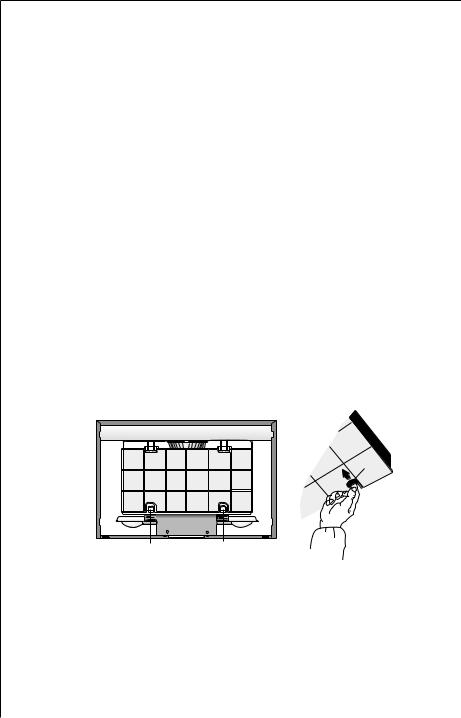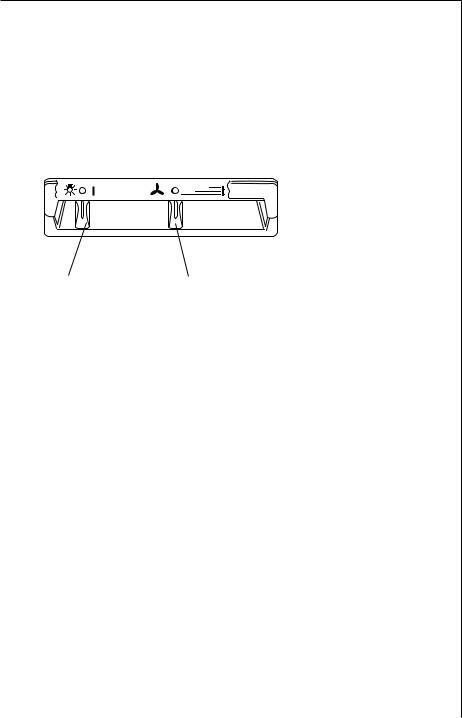AEG HE6260ML, CHDE6260 User Manual
DE 6250
DE 6260 CHDE 6260 335 D
Dunstabzugshaube
Afzuigkap
Hotte
Cooker Hood
Montageund Gebrauchsanweisung Installatieen gebruiksaanwijzing Notice d’utilisation et d’installation Operating and Installation Instructions

Contents
Safety warnings |
38 |
For the user |
38 |
For the installer |
38 |
Description of the Appliance |
40 |
Extractor version |
40 |
Recirculation Version |
40 |
Hood Operation |
41 |
Maintenance and care |
41 |
Metal grease filter |
42 |
Open the metal grease filter |
42 |
Charcoal filter |
43 |
Changing the light bulb |
44 |
What to do if |
45 |
Service and spare parts |
46 |
Technical Details |
47 |
Electrical connection |
47 |
Printed on recycled paper
AEG - putting words into action
37

 Safety warnings
Safety warnings
For the user
•The cooker hood is designed to extract unpleasant odours from the kitchen, it will not extract steam.
•Always cover lighted elements, to prevent excess heat from damaging the appliance. In the case of oil, gas and coal fired cookers it is essential to avoid open flames.
•Also, when frying, keep the deep frying pan on the cooker top/cooker under careful control.
•The hot oil in the frying pan might ignite due to overheating.
•The risk of self-ignition increases when the oil being used is dirty.
•It is extremely important to note that overheating can cause a fire.
•Never carry out any flambé cooking under the hood.
•Always disconnect the unit from the power supply before carrying out any work on the hood, including replacing the light bulb (take the cartridge fuse out of the fuse holder or switch off the automatic circuit breaker).
•It is very important to clean the hood and replace the filter at the recommended intervals. Failure to do so could cause grease deposits to build up, resulting in a fire hazard.
For the installer
•When used as an extractor unit, the hood must be fitted with a 120mm diameter hose.
•When installing the hood, make sure you respect the following minimum distance from the top edge of the cooking hob/ring surfaces:
electric cookers |
600 mm |
gas cookers |
650 mm |
coal and oil cookers |
700 mm min. |
•The national standard on fuel-burning systems specifies a maximum depression of 0.04 bar in such rooms.
•The air outlet must not be connected to chimney flues or combustion gas ducts. The air outlet must under no circumstances be connected to ventilation ducts for rooms in which fuel-burning appliances are installed.
•The air outlet installation must comply with the regulations laid down by the relevant authorities.
•When the unit is used in its extractor version, a sufficiently large ventilation hole must be provided, with dimensions that are approximately the same as the outlet hole.
38

•National and regional building regulations impose a number of restrictions on using hoods and fuel-burning appliances connected to a chimney, such as coal or oil room-heaters and gas fires, in the same room.
•Hoods can only be used safely with appliances connected to a chimney if the room and/or flat (air/environment combination) is ventilated from outside using a suitable ventilation hole approximately 500-600 cm2 large to avoid the possibility of a depression being created during operation of the hood.
•If you have any doubts, contact the relevant controlling authority or building inspector’s office.
•Since the rule for rooms with fuel burning appliances is “outlet hole of the same size as the ventilation hole”, a hole of 500-600 cm2, which is to say a larger hole, could reduce the performance of the extractor hood.
•If the hood is used in its filtering function, it will operate simply and safely in the above conditions without the need for any of the aforementioned measures.
•When the hood is used in its extractor function, the following rules must be followed to obtain optimal operation:
—short and straight outlet hose
—keep bends in outlet hose to a minimum
—never install the hoses with an acute angle, they must
always follow a gentle curve only
— keep the hose as large as possible (preferably the same diameter as the outlet hole).
•Failure to observe these basic instructions will drastically reduce the performance and increase the noise levels of the extractor hood.
39

Description of the Appliance
•The cooker hood is designed to extract unpleasant odours from the kitchen, it will not extract steam.
•The hood is supplied as an extractor unit and can also be used in a recirculation mode by fitting one charcoal filter (available from your local Service Force Centre).
Extractor version
•In this version fumes are extracted to the outside via a hose.
•In order to obtain the best performance the hose should have a diameter equal to the outlet hole.
Recirculation Version
•The air is filtered through a charcoal filter and returned to the kitchen.
•You will need an original AEG charcoal filter for the recirculation function. (Available from your local Service Force Centre).
•Insert the charcoal filter into the lugs of the frame above using the 2 red lugs E to retain it, press the red lugs inwards, and insert the charcoal filter in the frame. Fig. 1.
|
E |
E |
E |
|
Fig. 1 |
40

Hood Operation
•Best results are obtained by using a low speed for normal conditions and high speed when odours are more concentrated. Turn the hood on a few minutes before you start cooking then you will get an underpressure in the kitchen. It should be left on after cooking for about 15 minutes or until all odours have disappeared.
The control switches are located on the unit’s front panel:
ON
OFF
Intensive speed
Light switch |
Motor switch |
The hood is also equipped with a micro-switch which can be found under the lower runner of the visor on the right hand side.
With this micro-switch, the appliance may be automatically switched on and off by opening and closing the pull-out panel, but only if the fan speed has already been set and the light button is turned to “I”.
Maintenance and care
•The hood must always be disconnected from the electricity supply before beginning any maintenance work.
•Never insert pointed objects in the motor’s protective grid.
•Wash the outside surfaces using a delicate detergent solution. Never use caustic detergents or abrasive brushes or powders.
•Only ever clean the switch panel and filter grille using a damp cloth and delicate detergents.
•It is extremely important to clean the unit and change the filters at the recommended intervals. Failure to do so will cause grease deposits to build up that could constitute a fire hazard.
41
